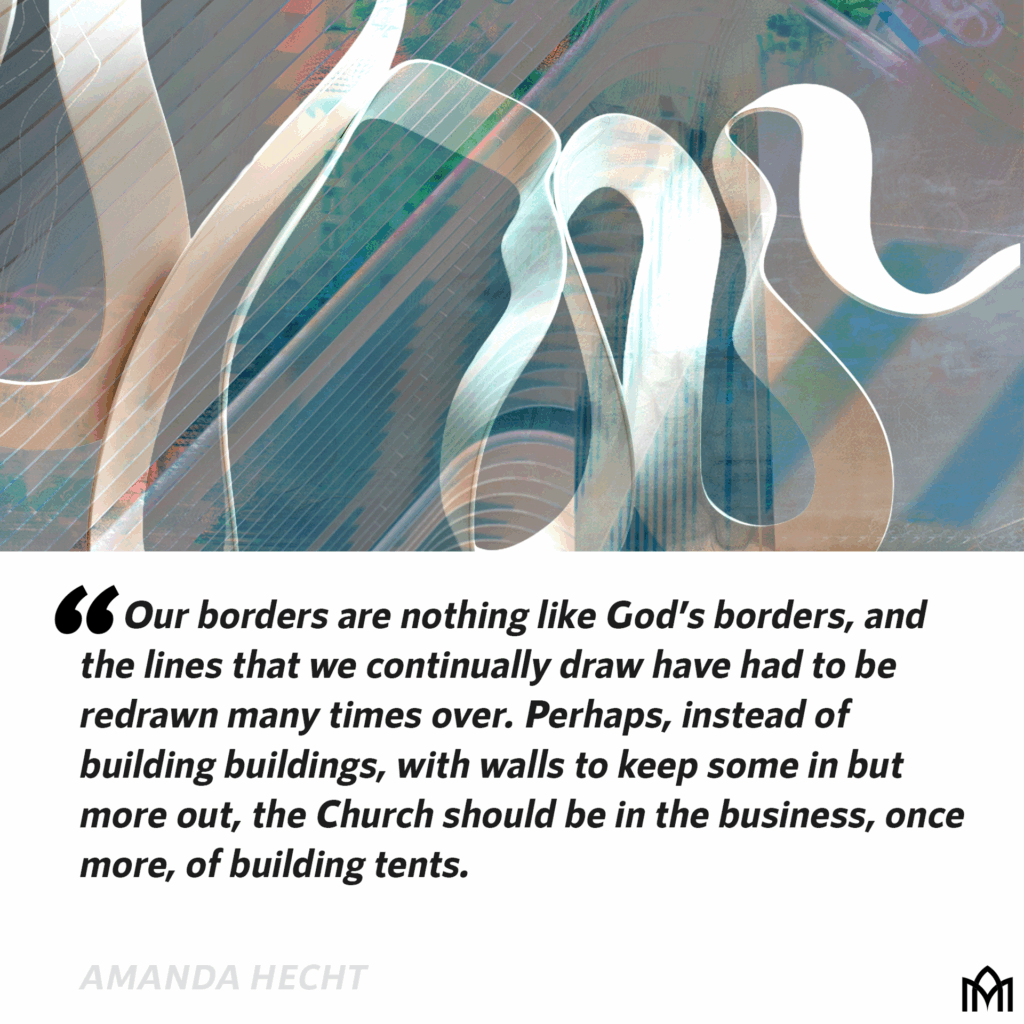Reclaiming the Tent

Perhaps the Church is Not a Building After All
*Author Note: This letter to the church is written in the voice of Phoebe of Cenchreae, whom Paul commended to the churches in Rome in Romans 16:1. Many scholars believe this indicates that Phoebe was commissioned by Paul to carry the letter we now know as “Romans” from Paul to Rome. Some go even further and suggest that Phoebe would also have read the letter aloud to the intended recipients. In my sanctified imagination, Phoebe has visited the Church today, and is writing to her old friend and colleague, the Apostle Paul, about her observations.
~Amanda (Mandi) Hecht
My Dear Friend Paul,
Long ago, you and I labored and collaborated on an important task–writing and carrying a letter (known today simply as “Romans”) to the great city of Rome. Today, I am writing to you to describe followers of “the Way,” which has become known as the Christian Church, some 2000+ years after you and I both played our parts in its initial growth.
I think you would be pleased about many things regarding the Church so far into the future. For instance, the people who follow Jesus, who are widely known as “Christians” now, have churches that gather all over the globe. We used to meet in houses and villas (such as mine which I made available for the meetings of “the Way” in my own beloved Cenchreae1See Romans 16:1.), but they meet now in buildings dedicated to that purpose! Some are small and humble, some are grand and impressive. Some are gorgeous with stained glass and vaulted ceilings, and others are more like the kind of gatherings you and I would recognize–any school gym, community hall, or living room where there is ample space to gather.
And Christians today, when they gather, still read those words that you wrote to the followers of Jesus in our day! The words that you and I and Tertius (our trusty scribe) wore out his wax tablet working out, the ones that I carried under my robe on the way to Rome are now afforded prime real estate in the bound book they read in their worship services. This book contains a wealth of stories about Jesus. Oh, how I wish I had these stories collected in one place when I was learning about Jesus! In addition to these stories of Jesus, Christians over the centuries have collected many of the letters that you wrote, as well as some of the words that some of our friends and successors in the faith circulated. Did you know, my dear and wise friend, that your words (written with the help of all the people around you that you could pull in) would still be read centuries after we all passed on into glory? Or that these words would still be in circulation down through the ages? Perhaps you did.
I think that if I’d known that, I might have been more circumspect–after all, the message that we crafted were words intended for our time and place, and our local community. If we had to consider not only our community but also the generations of people who would come after us–whose worlds we could not possibly know–then perhaps I would have hesitated to say anything at all. To think of people centuries in the future is too weighty a responsibility. However, I digress…
What I really want to write to you about, Paul, is not about the absolute embarrassment of riches that these Christians have in terms of access to a Bible with a wealth of stories and instructions, nor about the church buildings (grand and humble, ones that are newly built and some that are centuries old) that circle the entire world. Instead, I am writing to you today about tents.
I picked up a newspaper (No time to go into what those are right now…) and read a headline that caught my eye. It was about an encampment that had sprung up as frigid winter temperatures came upon a city.2Halyna Mihalik, “Encampment Torn Down After Heated Week 1.” CBC News, November 29th, 2024. Accessed December 2nd, 2024 at https://www.cbc.ca/news/canada/saskatoon/encampment-torn-down-after-heated-week-1.7397516. Even though I noticed that the world has changed a lot between our day and this one that I am writing to you from, there is one way that it has not changed–there are still people who live in poverty, and some who don’t have a warm place to live. The existence of people who are poor and struggling is nothing new to us, of course, but I had hoped that the fact that Christians are now in virtually every part of the world might have made a difference in this. There is much I can say, and much you might have to say too, about what it means to live as followers of Jesus in a world with poverty and inequality, sorrow and hurt. But that, too, is not the purpose of this letter.
When I thought about this encampment, or “tent-city” as they have sometimes been called, what comes to mind is that this community of tents sprung up as a last resort for people who have nowhere else to go, no other shelter in the freezing cold. And so, they came together and slept in tents around a fire that they took turns tending, all so that they could survive. It was the fire that was the problem in the news article that I read, and the possibility that it would burn out of control. But now that this encampment has been torn down, the people who found temporary shelter in these tents are back to having nowhere to go on these cold nights. There is a crisis of housing, particularly affordable housing, even in relatively affluent countries like the country of Canada, which is where this news article originated. No time to get into modern countries in this letter either, dear friend.
Reading this headline made me consider something else related to Christian communities in the modern world. Paul, I think there is a crisis of housing in our Christian communities. This is rather ironic, considering the number of buildings that I spoke to you about. With all this space, no one should have a problem finding a home in a Christian community. But I can tell you that many of these buildings echo endlessly when it comes time to observe worship, because fewer and fewer are coming to attend.
And yet, at the same time, there are a growing number of people finding themselves “spiritually houseless.” By this I am referring to people who love Jesus and desire to follow and serve him, but who find themselves somehow unwelcome in Christian communities. Some of them are in this position because they have begun to question some of the things that they have long been taught within the walls of the church, while others have left because they have seen the moral failure of their own leaders in these churches (sometimes up close and personally) .
Sin and failure, even from leaders in the church, comes as no surprise to me, Paul, and it would not, I expect, to you either. The Christian community has always been made up of human beings, and even those known as the “pillars” of our early Christian community–such as Peter, James, and John,3See Galatians 2:9. or other strong leaders such as Barnabas,4Barnabas was a travelling companion of Paul’s in the book of Acts, and once they split up, they had parallel ministries that took them both into Gentile territory. Mary,5Mary was the leader of a house church in Jerusalem, and the mother of John Mark (See Acts 12:12). or Euodia and Syntyche–6These 2 women were leaders in the Christian community in Philippi (See Philippians 4:2ff).well, you and I both know that not a one of them was perfect. Did you know that records of the way that you quarreled with Barnabas,7See Acts 15:36-39. and how you at one time opposed Peter–8See Galatians 2:11-14.they still exist in the written record that Christians read and study? This is humbling knowledge.
Others are spiritually “houseless” because the community that they were once a part of no longer accepts them. It is difficult, when you expect to see good within the Christian community and you find sin where you did not expect it. And it is just as shocking to see goodness in the world where you assumed it was absent. In our day, it was surprising to some to see goodness among the Gentiles. I know this because I am one. Today, this question has been well and truly resolved (Something else you might rejoice about, Paul!), but new ways of drawing boundaries, of determining that “no good can reside over there” have taken its place. Philip learned this,9See Acts 8:26-40. and Peter learned this,10See Acts 10 and 11. and you, Paul, felt a strong calling to live your life in service to carrying the Gospel to the Gentiles.11See Galatians 2:7. But the truth of the matter is that the boundaries that existed in our day were not God’s boundaries. And today’s borders similarly do not reflect God’s borders either.
These disagreements are nothing new to you and to I, my old friend. From my understanding of the history of the Church, since Jesus called more than one person to follow him, there have been disagreements among believers in Jesus in how to best follow after Jesus. This was the entire purpose for your writing to Rome, and you enlisted me in that endeavor. There were major disagreements among that community, roughly along ethnic lines, and it resulted in the people there wanting essentially to split up for good. And you wrote to them, not so much to solve the matters that were tearing them apart, but urging them to both recognize the beautiful gift that is being considered part of the family of God.12This is seen throughout the book of Romans, but you can reference Romans 5:1-11 for a quick overview.
Indeed Paul, you could hardly finish a thought when you were writing that letter without breaking out into a song of praise to God for the indescribable gift of Jesus the Messiah.13Again, this is seen all throughout the book of Romans, but a good example is found in Romans 8:31-39. Because Jesus came into the world, everything had changed–not only between God and humanity, but also between human beings themselves. The love of Jesus came to make peace everywhere–including between us as siblings in the faith (forever warring, or so it seems). Because of this, you wrote that we should accept one another–and even beyond mere acceptance, to welcome one another14See Romans 15:7-9..
Paul, I fear that the Christians of today are so concerned with smaller matters15See Romans 14:1, as well as chapter 15., differences of faith and practice (which, of course, we are familiar with) that they are creating this problem of empty spaces dedicated to worship, while many others go without the shelter of a community of faith with which they can work out their salvation.
I am concerned that people are prioritizing their buildings at the expense of building tents.
And you, my good friend, were a tent-maker.
Yes, I know that this was partly just an accident of history, that you worked a job that would allow you to have some income so that you were not entirely reliant on church communities to pay your way. I know that your business helped you to find those connections, which reached even more people like me with the good news about Jesus the Messiah. But I wonder if there was more to your “day job” (as some call it today) than simply extra cash flow. After all, you relied on wealthy benefactors like Joanna and myself, and you certainly weren’t shy about depending on these resources from time to time. (By the way, I am not saying that I minded this reality. After all, when I began to follow Jesus, everything in my life, including my wealth and my business connections were at the disposal of the burgeoning Christian community). Paul, I am beginning to wonder if being a tent-maker was also part of the way that you understood God, part of the way you made sense of your place in the world as a laborer on God’s behalf.
I began my life as an outsider to God’s people. I was a Gentile, through and through. When I grew up, I did not learn names like Abraham, Sarah, Moses, Joshua, Rahab, Ruth, or David. I grew up learning stories about Zeus, Artemis, Hermes, and Athene. And so that letter that we worked on to bring to the churches in Rome–that letter meant much to me personally. I remember when this letter was read to the original hearers, how a hush would fall over the room when we got to the bottom line of the entire letter, the ultimate summarization of the entire letter, near to the end: “Welcome one another, therefore, just as Christ has welcomed you, for the glory of God” (Romans 15:7). I was so grateful that you welcomed me into the family of Christ, Paul. I know that, on my own, had no right to stand there, an equal among God’s chosen people, a member of God’s family. But because of the life, ministry, death, and resurrection of Jesus, you reassured me that I belonged within the community of people who called Jesus their Lord.
And it was not just me that you welcomed, it was also the people in my home city of Cenchreae–a community that decidedly swam in the waters of Rome. We practiced table fellowship in keeping with our Gentile nature, which was very different from the practices of some of the Judean believers in Rome. And yet, you still reassured us that our community fit, that it was still covered by the wide tent of Christ, and that we belonged to “the Way” as much as the gatherings in Jerusalem, Rome, and other places that made up our network.
Paul, you extended the tent. You made it wider. You moved the boundaries, so that someone like me, who was not initially part of the people of God, had a place inside. And for that, I am forever grateful. This was the message that you were desperate to send to the community of Christ followers in Rome. This message drew me in, and I was thrilled that you enlisted my services to carry this letter and ensure its safe delivery to the church in Rome.
When I observe the church today, Paul, I am concerned that the “tent” is not being made large enough. With all this space, with all this diversity, with followers of “the Way” spread out all over the globe, it should not be challenging at all to welcome one another, just as Christ welcomes each one of us.
///
Paul, you extended the tent. You made it wider. You moved the boundaries, so that someone like me, who was not initially part of the people of God, had a place inside. And for that, I am forever grateful. Share on X
Now, I was an outsider to the chosen people of God, and so I had to learn the ways, the history, and the sacred writings of the Hebrew people. And when I did, I discovered that God’s people have long relied upon tents. When God led the Hebrew people out of slavery in Egypt, God travelled with them in a tent which moved with the people. Wherever they were, they set up their tabernacle that they carried with them, which reassured them that God with them, wherever they lay their heads.
Many years later, when the people had moved into a land of their own, and did not have to wander any longer, King David proposed moving God’s dwelling away from this tent structure, and into a more permanent building known as a temple. The temple was eventually built and became the center of worship for the Hebrew people, a permanent symbol of the presence of God. However, God’s first reaction to building an immovable structure to “house” God was to remind King David that God had always moved with God’s people in a tent. God had never once asked anyone to construct a building for God to live within that stayed in one spot (2 Kings 7:6-7).
It seems to me that God is quite content to be where the people are, even if it means moving around.
Paul, I had a peek recently at one of those wonderful sketches of the life of Jesus that are now included in the holy scriptures that Christians read–a Gospel that goes by the name “John.” In it, John tells everyone that Jesus was God’s Word which became a human being, and made his dwelling among us (John 1:14). Our very own Jesus, living among the people! Jesus moved into our own neighborhood! Jesus is also content to live in a tent (his human body), if it means that he is close to people, and that more people can draw near to him.
And yet, over time, as many have observed, “canvas-walled tents solidified into the pillars and canopies of megachurches, and many travelling evangelists set down roots with indoor pulpits.”16Angela Reitsma Bick and Peter Schuurman, Blessed Are The Undone: Testimonies of Quiet Deconstruction of Faith in Canada, New Leaf Press Network: Saskatoon, SK, Canada (2024), 38. This entire book uses a similar metaphor that I have been employing–the metaphor of wilderness camping–to explore what is known as the “deconstruction” movement through a Canadian lens.
Now, I am not Judean, but I do know that the temple was very important to Judean people in our time and place. It was the center of worship and community life. But I also know this–this temple was destroyed in my lifetime. As Jesus himself predicted, not one stone was left on top of another, so complete was the devastation of that place (Mark 13:1-2). Buildings, as impressive as they can be, are not what is needed to be a follower of God. Tents are enough.
In the news article that I referenced earlier, the Indigenous activist who had organized this encampment said that what he might do next was build a teepee. Teepees are a tent-type dwelling that have been used for centuries by Indigenous cultures throughout North America (Better known as Turtle Island within Indigenous circles). The city officials in this news story agreed that a teepee would pose less of a risk for fire burning out of control, or for dangerous carbon monoxide build up, and so they would support this activist if he choose to go this route. This Indigenous activist intended to build a better tent so that he could be closer to, and house, more people.
Could Christ-followers learn from this ingenious, ancient approach? I certainly think so.
God had never once asked anyone to construct a building for God to live within that stayed in one spot (2 Kings 7:6-7). It seems to me that God is quite content to be where the people are, even if it means moving around. Share on X
///
There is a story about how, when Jesus was crucified, the curtain in the temple was torn in two (Matthew 27:51). God’s Spirit had left the permanent structure, and the barrier was destroyed. And now God is closer than ever to people. We don’t have to go travel to God; God will continue to come to us! God will find us–in our Cenchreaes, our Romes, our Galatias, our Corinths, and our Laodiceas. God will find us in our gleaming, modern-day cities, and in our rural, more remote areas as well. God’s people have spread out all over the globe. There is no reason why they cannot stretch their tents as wide as they will go, becoming shelter for one another.
I am not sure about these buildings, Paul. A building can be locked. A building has walls that distinguish who is
“inside”–but also, more importantly, who is left outside in the cold. This has sadly become the mentality of many Christians. They have moved away from the permeable boundaries of tents, trading these expansive dwelling places for hard theological lines, for statements to sign that are a far cry from the way that we first conceived about things, such as “If you confess with your mouth that Jesus is Lord, and believe in your heart that God raised him from the dead, you will be saved” (Romans 10:9).
It would be wonderful, Paul, if we built tents to house those who are currently spiritually “houseless” but who long to sit around the table of Jesus once again. We must build tents because we have long known that our borders are nothing like God’s borders, and the lines that we continually draw have had to be redrawn many times over. Perhaps, instead of building buildings, with walls to keep some in but more out, the Church should be in the business, once more, of building tents. Perhaps we must follow the wisdom and generosity of the Indigenous elder who thought that his teepee might bring warmth, community, and safety to his neighbors once more.
Yours in Christ,
~ Phoebe*
(*aka, Mandi)
///
*Editorial Note: Letters to the Church is Missio Alliance’s newest long-form series. The latest letter to our growing collection will go live each Friday throughout the rest of 2025. We invite you to prayerfully listen to the Spirit as you read, asking God what you might say to the Church in your own voice. ~CK
“Anyone with ears to hear must listen to the Spirit and understand what God is saying to the churches.” (Revelation 2:29)
Perhaps, instead of building buildings, with walls to keep some in but more out, the Church should be in the business, once more, of building tents. Share on X




